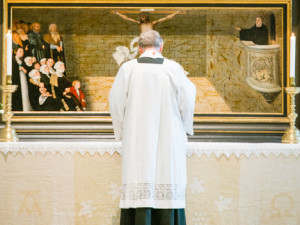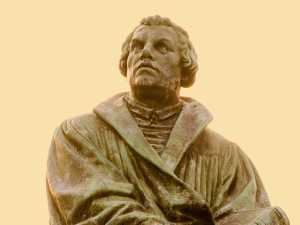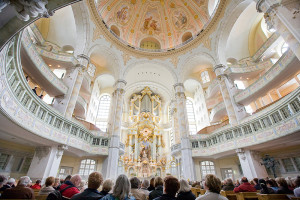by Rev. A Brian Flamme
 Feet are not especially beautiful, if I may say so. They’re often callused, gnarled looking things that wear out quickly from age and mileage. When you rack up enough miles on your car’s tires, you change them out. Not so with feet. And yet, St. Paul quoting the prophet Isaiah writes, “How beautiful are the feet of those who preach the Good News” (Romans 10:15).
Feet are not especially beautiful, if I may say so. They’re often callused, gnarled looking things that wear out quickly from age and mileage. When you rack up enough miles on your car’s tires, you change them out. Not so with feet. And yet, St. Paul quoting the prophet Isaiah writes, “How beautiful are the feet of those who preach the Good News” (Romans 10:15).
You would think that preachers who bear glad tidings would be praised through describing other more dignified parts of the body. Maybe the preacher’s voice should be called beautiful because of how sweetly his words strike the ear, or perhaps his face because it captivates his hearers with its expressive charm. Exulting these things makes sense. But the feet?
The whole point of feet is to get you from A to B, and then maybe to C. A messenger without feet can only benefit the people who happen to stumble into earshot. But once you give him feet, suddenly the message can run over the face of the earth. Imagine what that means if the man doesn’t bear an ordinary message, but the very Word of God, the Gospel, the forgiveness of sins for the sake of Jesus’ blood and righteousness that sets consciences free.
To run to the ends of the earth preaching the Gospel is precisely Jesus’ charge to his Apostles (Acts 1:8). Luther writes about them, “Their running, I say, is truly sweet, that is, their ministry is most delightful, not like that of Moses and the prophets. To run means to serve in the office of preacher, as Paul says (Phil. 2:16): ‘I did not run in vain.’ Thus the foot is the instrument of his running. For when the Gospel runs, it proclaims all good things, cheerfulness of conscience, deliverance from the Law, and the best use of all external things…Through the Gospel of God we receive unending gifts.”[i]
Suddenly I’ve got a whole new perspective on feet, at least as it concerns the Apostles. The feet are beautiful because it means that these men have been sent! But what about the next time you happen to get a glimpse at your pastor’s feet? He’s not been directly charged by Christ to preach like the Apostles, has he? Well, he has been charged by Christ, just indirectly through the church. That’s how men enter the office today (Titus 1:5). But let me explain how we, as Lutherans, have sharpened our doctrine of the ministry.
Before the Reformation the Papacy gave the comfort of Apostolic succession accompanied by the special grace of ordination. The Apostles handpicked their successors and gave them grace, who then handpicked their successors and gave them grace, who handpicked their successors… You get the point. But once the Evangelical churches realized that Rome had rejected the truth, that the special “grace” of ordination would be withheld from them, then they had to raise up their own preachers. But how could they be sure that they were getting the real deal?
It turns out that where the Lord Jesus reforms his church with his Gospel, he doesn’t leave his church without the comfort of knowing that he has chosen men to preach and teach the saints. Indeed, since Luther and the Lutherans had the Gospel right, the teaching and practice of the other articles of Christian doctrine fell into place, including doctrine and practice of Holy Ministry.
 Luther began working on articulating the doctrine of the ministry already in 1523. He writes, “Either we must learn how to provide ourselves with presbyters apart from papal tyranny, or if we are not willing to do so (though it is possible) we must give ourselves into captivity…”[ii] Luther correctly argues that Jesus gives the obligation to publicly preach, teach, and administer the sacraments to his whole church, indeed to every Christian, not to a select few super-spiritual clergy persons who get to choose the priests who come after them. Yet, because it’s the common property of all Christians to preach, “no one individual can arise by his own authority and arrogate to himself alone what belongs to all.”[iii] However we know that someone must preach, teach, and administer the sacraments. So Luther continues, “But the community rights demand that one, or as many as the community chooses, shall be chosen or approved who, in the name of all with these rights, shall perform these functions publicly.”[iv]
Luther began working on articulating the doctrine of the ministry already in 1523. He writes, “Either we must learn how to provide ourselves with presbyters apart from papal tyranny, or if we are not willing to do so (though it is possible) we must give ourselves into captivity…”[ii] Luther correctly argues that Jesus gives the obligation to publicly preach, teach, and administer the sacraments to his whole church, indeed to every Christian, not to a select few super-spiritual clergy persons who get to choose the priests who come after them. Yet, because it’s the common property of all Christians to preach, “no one individual can arise by his own authority and arrogate to himself alone what belongs to all.”[iii] However we know that someone must preach, teach, and administer the sacraments. So Luther continues, “But the community rights demand that one, or as many as the community chooses, shall be chosen or approved who, in the name of all with these rights, shall perform these functions publicly.”[iv]
By 1529 Luther’s language becomes clearer when he zeros in on Jesus’ instituting words for the public preaching office found in John 20:29-23. In the same way as the Apostles were charged by Jesus to preach, so it must be for men in the preaching office today. Their call may be mediated through the church, but that doesn’t make Jesus’ charge any less clear or important. “Whoever is called to it and has the mandate should preach the Gospel, should baptize, should loose sins through the power of Absolution, should impose the ban through the power of the Keys, would rebuke and admonish, etc. Let him proceed with confidence and not be afraid, whatever may befall him on this account.”[v]
For Luther and the Lutherans, it was enough that a man be instructed in God’s Word, examined, and then called and ordained by the whole church to publically preach in a certain place.[vi] This is what’s reflected in the language of Article XIV of the Augsburg Confession. This is the regular practice of our Synod today. That’s why it’s important that your pastor has gone to one of our seminaries, so that you’ll have confidence that he’s been properly instructed and examined so that when he speaks he’s delivering God’s own Law and Gospel, not his own.
Unlike the clandestine preachers who sought to infiltrate the Lutherans and disrupt the peace with strange teachings, Luther writes, “We do not secretly infiltrate, but are called to our office and step forward publically; we have stood before spiritual and secular tribunals to give account. Our gospel is not a ‘corner sermon,’ but goes forth boldly and publicly…”[vii]
Your pastor’s call into the office of the Holy Ministry isn’t something to be ashamed of. That’s why we have ordination and installation services. It’s a kind of godly boasting that shows that God has chosen this man to serve in this place. “When we boast in this way, we are not looking for prestige or the good will of the world. The reason for our proud boasting is that we are in a divine calling and in God’s own work, and that the people need to be assured of our calling, in order that they may know that our word is in fact the Word of God. This, then, is not a vain pride; it is a most holy pride against the devil and the world. And it is a true humility in the sight of God.”[viii]
So it turns out that your pastor really does have beautiful feet! I’m speaking objectively of course. Don’t try to look too closely.
 One last thing. You may not have been placed into this special office of public preaching like your pastor, but that doesn’t make you any less a Christian. Indeed, I would step away from my office a thousand times if that was the only way I could keep Christ’s righteousness given to me in my baptism. There are always opportunities to speak the absolution and teach according to our respective offices. Fathers teach their families and wives instruct their children which is the pattern we learn from St. Paul (Ephesians 6:4). But notice that’s different from publicly teaching. What matters is that you and I both have Christ. When we do, the works of both pastors and lay people are precious in God’s sight.
One last thing. You may not have been placed into this special office of public preaching like your pastor, but that doesn’t make you any less a Christian. Indeed, I would step away from my office a thousand times if that was the only way I could keep Christ’s righteousness given to me in my baptism. There are always opportunities to speak the absolution and teach according to our respective offices. Fathers teach their families and wives instruct their children which is the pattern we learn from St. Paul (Ephesians 6:4). But notice that’s different from publicly teaching. What matters is that you and I both have Christ. When we do, the works of both pastors and lay people are precious in God’s sight.
Luther writes, “When I have [Christ’s] righteousness within me, I descend from heaven like the rain that makes the earth fertile. That is, I come forth into another kingdom, and I perform good works whenever the opportunity arises. If I am a minister of the Word, I preach, I comfort the saddened, I administer the sacraments. If I am a father, I rule my household and family, I train my children in piety and honesty. If I am a magistrate, I perform the office which I have received by divine command. If I am a servant, I faithfully tend to my master’s affairs. In short, whoever knows for sure that Christ is his righteousness not only cheerfully and gladly works in his calling but also submits himself for the sake of love to magistrates, also to wicked laws, and to everything else in this present life – even, if need be, to burden and danger. For he knows that God wants this and that this obedience pleases him.”[ix]
The Rev. A. Brian Flamme is a pastor at Hope Lutheran Church, Aurora, CO.
[i] LW 17:210
[ii] LW 40:18
[iii] LW 40:34
[iv] LW 40:34
[v] LW 69:359-360
[vi] LW 40:40
[vii] LW 69:366
[viii] LW 26:20-21
[ix] LW 26:11-12
